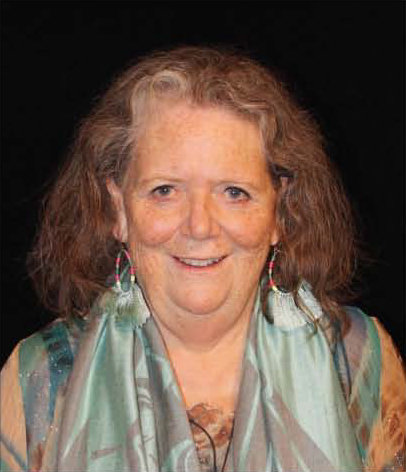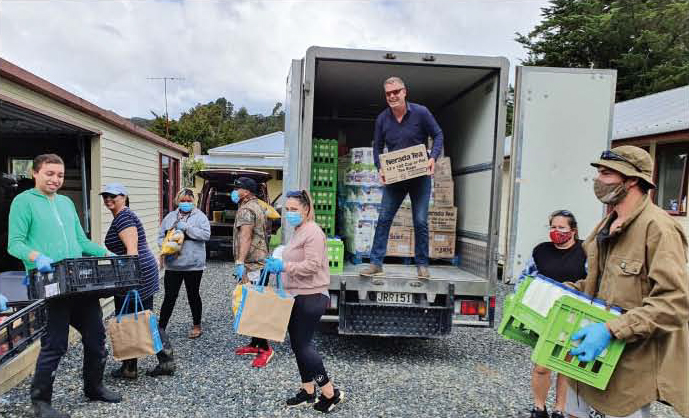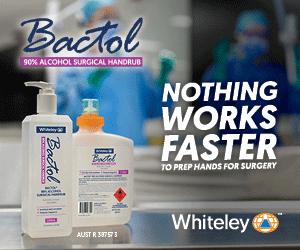
I think what really struck me is the amount of work Māori nurses do – the providers and the nurses. They initially saw that the information, vaccination and assessments weren’t getting out to the community – people weren’t turning up to the official testing stations, so they took matters into their own hands.
It was the leadership of our Māori nurses, and some places were really fortunate to have Māori doctors as well.
Nobody has any idea what it meant for Māori nurses – it doesn’t end there, on the frontline. Nurses get out to the marae, they do the vaccines and swabs, then they’re getting in their gumboots
and in their trucks to help deliver care packs to whānau in rural areas. Then they put their high heels on and deliver meals to our kuia and kaumātua.
Our Māori nurses and midwives are the backbone of Māori providers. These are people who really care about their community – which is primarily kuia and kaumātua and other vulnerable groups.
Nurses get out to the marae, they do the vaccines and swabs, then they’re getting in their gumboots and in their trucks to help deliver care packs to whānau in rural areas.
The number of people affected by COVID up here has been very small. It could have been so much worse. We have high poverty, a high Māori population, all those things, but we said: “We’ve got this, we’ve got to toke care of our people.”
Māori providers across Te Tai Tokerau joined forces, and they were involved in making sure we were taking care of our whānau and hapū.
Our iwi – Ngāpuhi, Ngāti Wai, Ngāti Hine and the hapū of Whangārei – we all agreed to work together and made sure our older people got care packs, with sanitiser, face masks, and things like that.
They had food too, but our kaumātua said “Keep the groceries, for the needy families”. So we started delivering homecooked meals to them instead, which could be frozen.
It doesn’t matter where you look, lots of people up here are vulnerable. We take care of everybody here, not just the older people. Everybody came to get vaccinations for the ‘flu – we made them freely available to everyone – and thought that will lessen the impact of winter. So people turned up and got vaccinated and had a COVID-19 test, too.
Providers were ringing people and checking on them. In the Far North district, they made some ‘kia ora calls’, and that grew into a community mental health support group.
At my marae, Matawaia, when they knew about the clinics, people told each other. At Ngāti Hine Haoura Health Trust, when they knew about the clinics, people told each other – families rang each other up, said “come on down”.
The main motivating factor was that nobody wanted the responsibility of passing on the disease to someone else. We felt a strong responsibility, as a whānau.
The second thing was we felt we were in this together – parents, elderly, young people, children – we are all vulnerable, so have to take care of each other.
And the other thing is that people came because they knew there would be a Māori nurse or doctor. Māori, first of all, are more likely to have the same experience, they come from whakapapa. They are more likely to understand your experience, and be far less judgemental than other people. It is trust. It showed we can take care of ourselves.
But in the first week of going into level two, the Government put out legislation restricting tangi – with no consultation with us, nothing.
An affront to Māori
We have a vested interest in managing this, we are not going to go to tangi. The threat was made that if we don’t obey, we will be invaded by police, with no warrant. For many people here, their background means that already happens, without that legislation. That caused a real furore, it was an affront to Māori, saying “you can’t take care of yourself”.
We’ve had two large tangi since then, for important people. Everybody went and maintained their distance, it was fine.
I am not that hopeful that a Māori approach would be given freely – I think we are going to have to battle for it. We are all prepared to do that.
We are not going back to “normal” as that normal was not very good for Māori. Our way is manaatikanga, looking after each other. We have shown that is good for everybody.

The difference is the care for vulnerable people from those who have had the experience of being Māori.
Why can’t we have this ordinarily? We are very capable of taking care of our own people. If we have the support, we get on with it.
Māori nurses all did amazing work, they had to deal with their own challenges, with their own whānau. But they were willing to go out and they kept going out.




